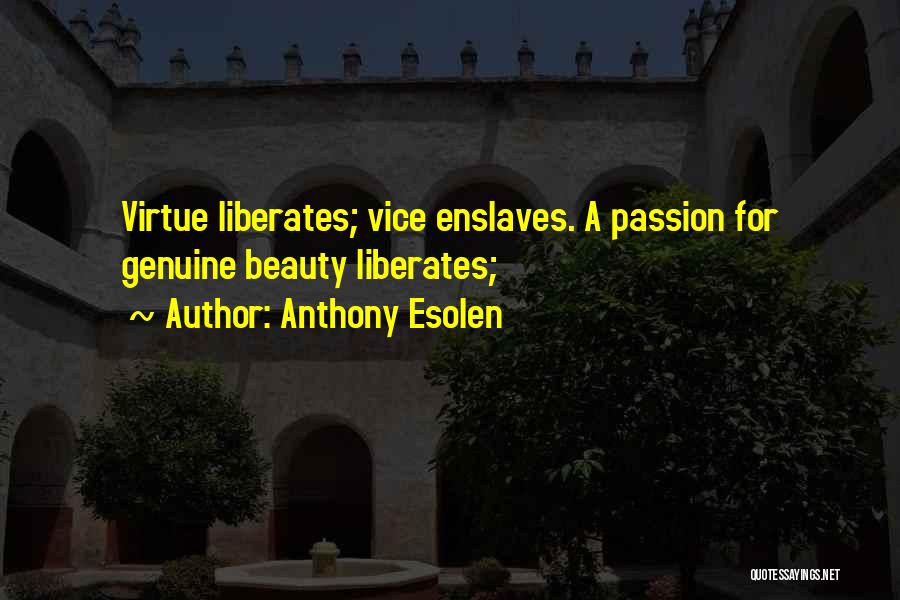Anthony Esolen Quotes & Sayings
Enjoy the top 47 famous quotes, sayings and quotations by Anthony Esolen.
Famous Quotes By Anthony Esolen
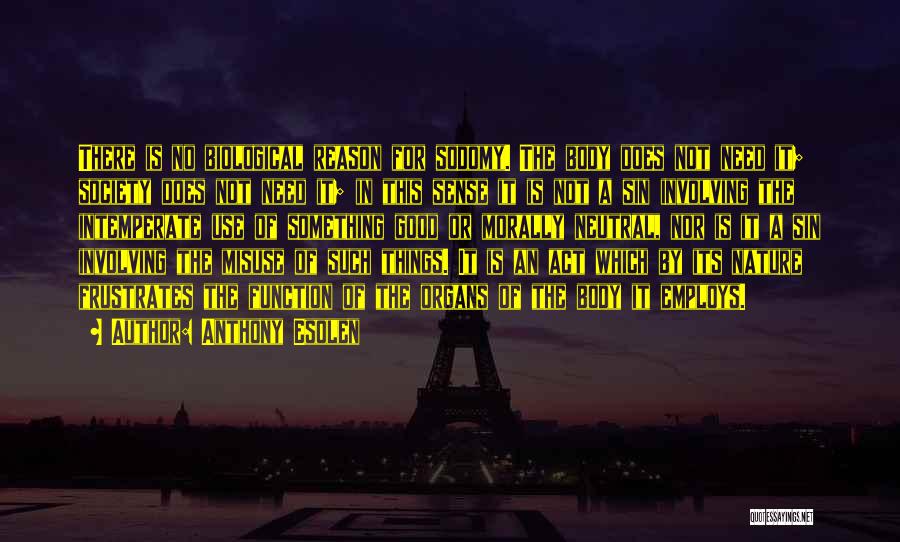
There is no biological reason for sodomy. The body does not need it; society does not need it; in this sense it is not a sin involving the intemperate use of something good or morally neutral, nor is it a sin involving the misuse of such things. It is an act which by its nature frustrates the function of the organs of the body it employs. — Anthony Esolen
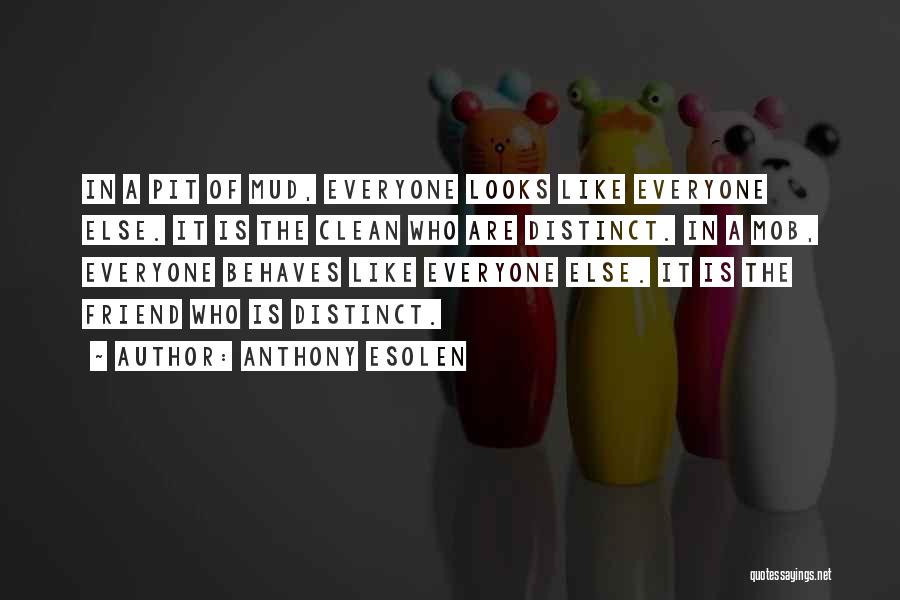
In a pit of mud, everyone looks like everyone else. It is the clean who are distinct. In a mob, everyone behaves like everyone else. It is the friend who is distinct. — Anthony Esolen
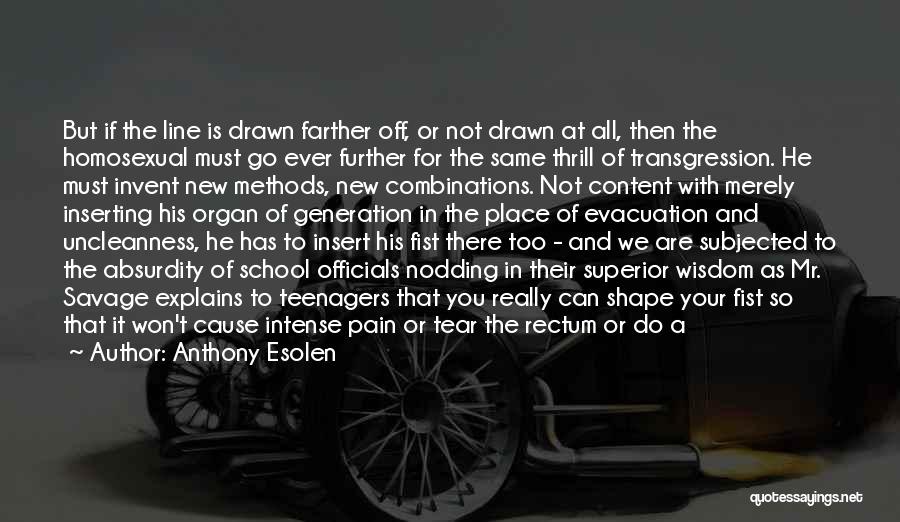
But if the line is drawn farther off, or not drawn at all, then the homosexual must go ever further for the same thrill of transgression. He must invent new methods, new combinations. Not content with merely inserting his organ of generation in the place of evacuation and uncleanness, he has to insert his fist there too - and we are subjected to the absurdity of school officials nodding in their superior wisdom as Mr. Savage explains to teenagers that you really can shape your fist so that it won't cause intense pain or tear the rectum or do a host of other things that he won't tell them about, because they involve diseases like hepatitis, and it's best to hide those things from teenagers who are apt to be squeamish about people sneezing on their lunch, let alone invading their intestines. — Anthony Esolen
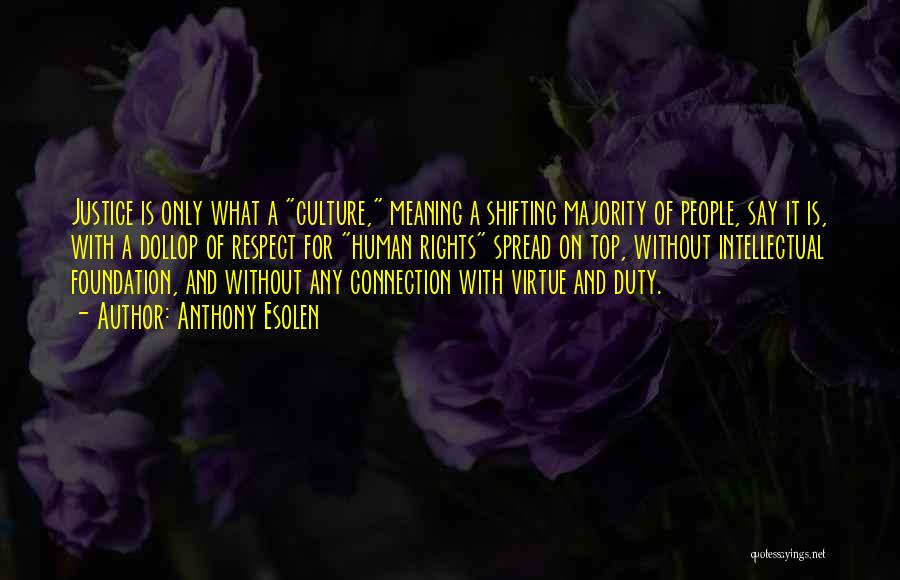
Justice is only what a "culture," meaning a shifting majority of people, say it is, with a dollop of respect for "human rights" spread on top, without intellectual foundation, and without any connection with virtue and duty. — Anthony Esolen
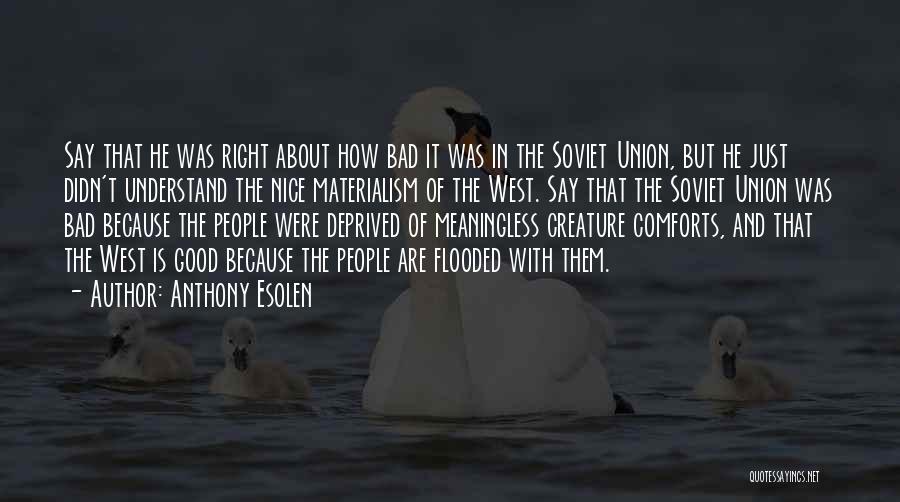
Say that he was right about how bad it was in the Soviet Union, but he just didn't understand the nice materialism of the West. Say that the Soviet Union was bad because the people were deprived of meaningless creature comforts, and that the West is good because the people are flooded with them. — Anthony Esolen
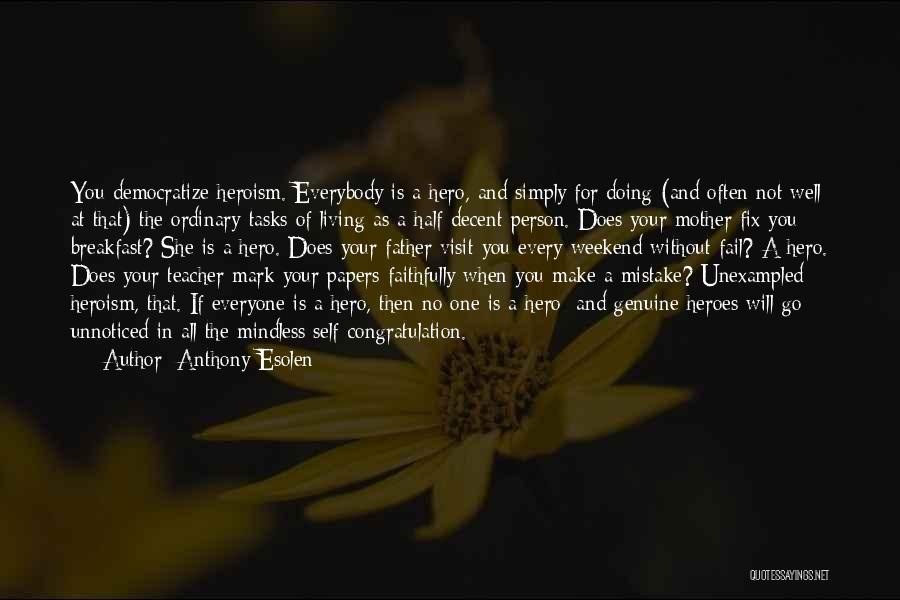
You democratize heroism. Everybody is a hero, and simply for doing (and often not well at that) the ordinary tasks of living as a half-decent person. Does your mother fix you breakfast? She is a hero. Does your father visit you every weekend without fail? A hero. Does your teacher mark your papers faithfully when you make a mistake? Unexampled heroism, that. If everyone is a hero, then no one is a hero; and genuine heroes will go unnoticed in all the mindless self-congratulation. — Anthony Esolen
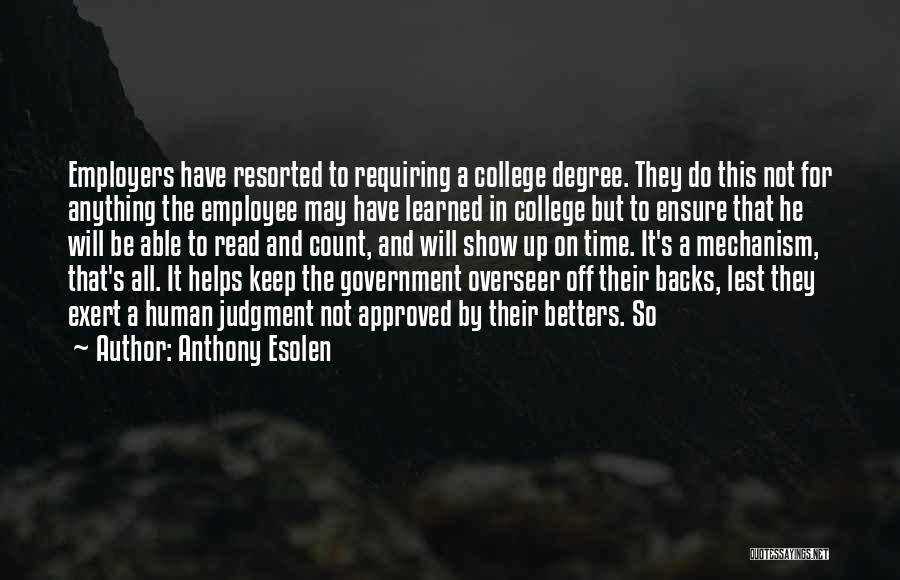
Employers have resorted to requiring a college degree. They do this not for anything the employee may have learned in college but to ensure that he will be able to read and count, and will show up on time. It's a mechanism, that's all. It helps keep the government overseer off their backs, lest they exert a human judgment not approved by their betters. So — Anthony Esolen
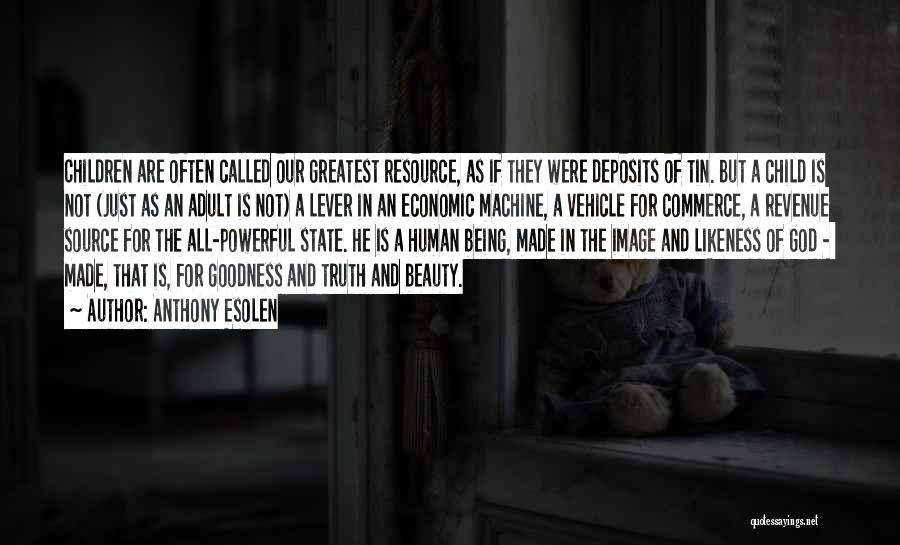
Children are often called our greatest resource, as if they were deposits of tin. But a child is not (just as an adult is not) a lever in an economic machine, a vehicle for commerce, a revenue source for the all-powerful state. He is a human being, made in the image and likeness of God - made, that is, for goodness and truth and beauty. — Anthony Esolen
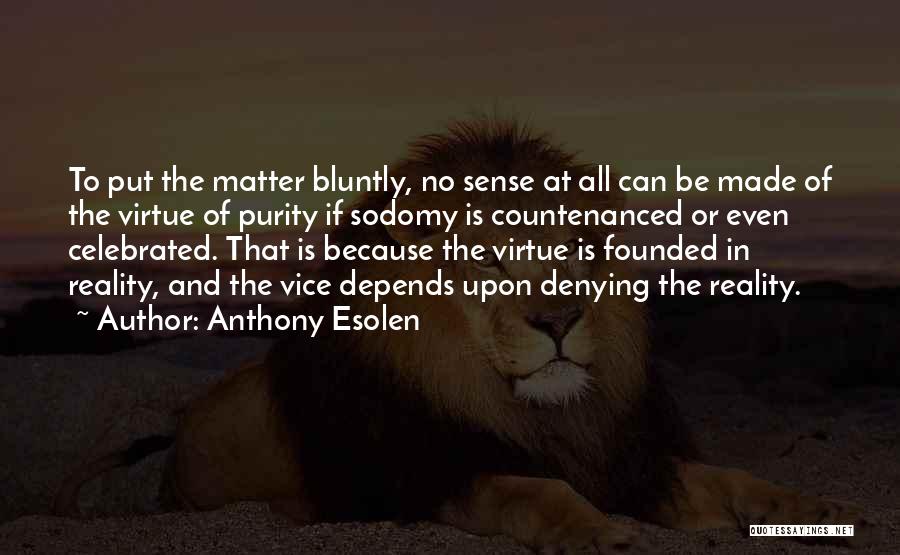
To put the matter bluntly, no sense at all can be made of the virtue of purity if sodomy is countenanced or even celebrated. That is because the virtue is founded in reality, and the vice depends upon denying the reality. — Anthony Esolen
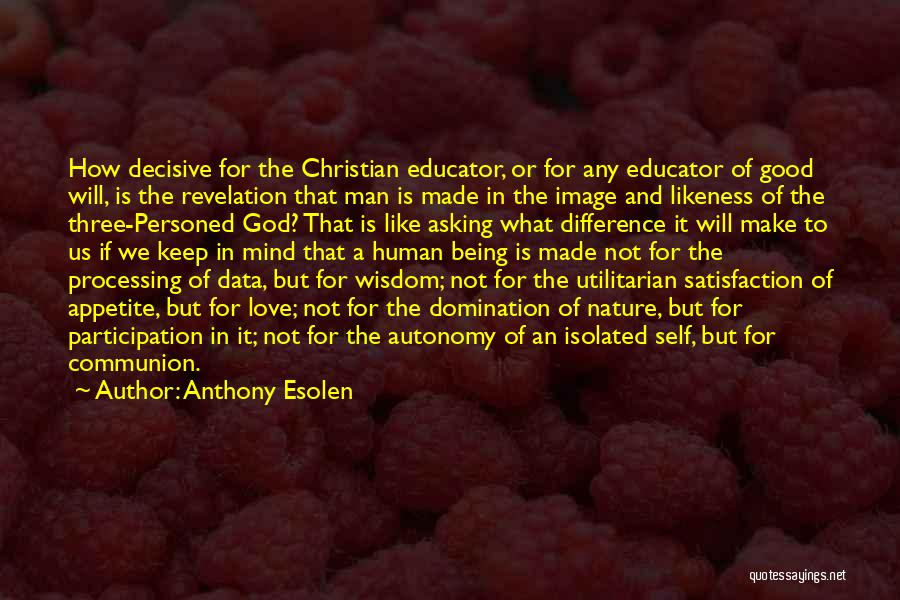
How decisive for the Christian educator, or for any educator of good will, is the revelation that man is made in the image and likeness of the three-Personed God? That is like asking what difference it will make to us if we keep in mind that a human being is made not for the processing of data, but for wisdom; not for the utilitarian satisfaction of appetite, but for love; not for the domination of nature, but for participation in it; not for the autonomy of an isolated self, but for communion. — Anthony Esolen
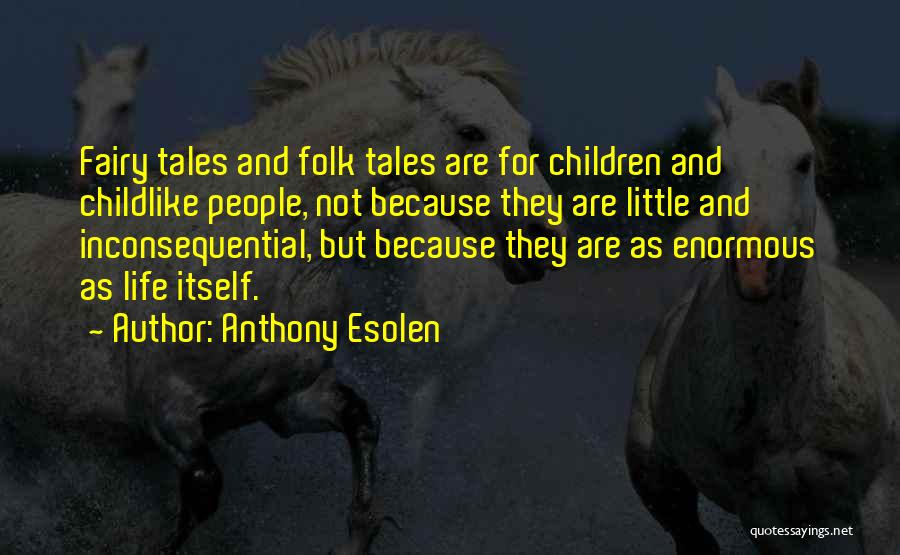
Fairy tales and folk tales are for children and childlike people, not because they are little and inconsequential, but because they are as enormous as life itself. — Anthony Esolen
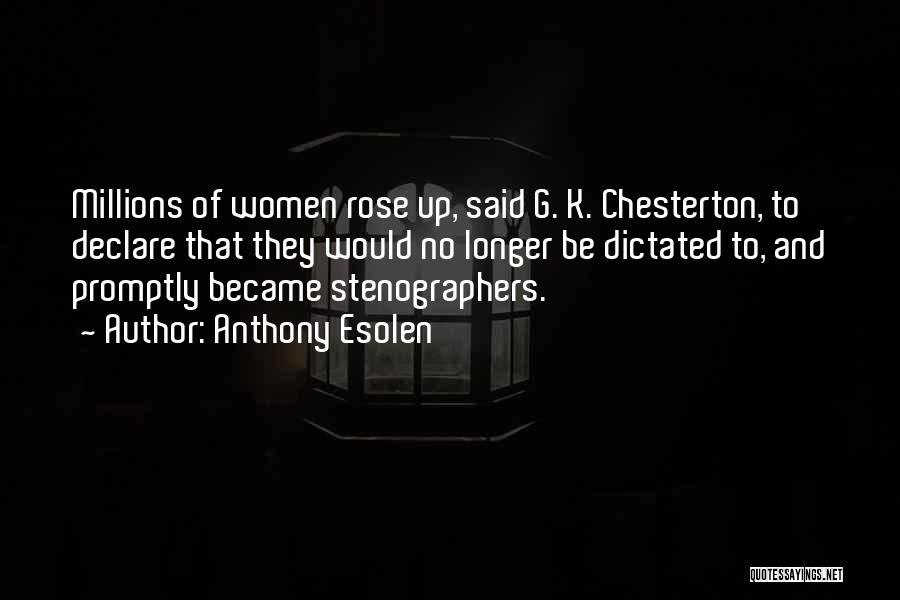
Millions of women rose up, said G. K. Chesterton, to declare that they would no longer be dictated to, and promptly became stenographers. — Anthony Esolen
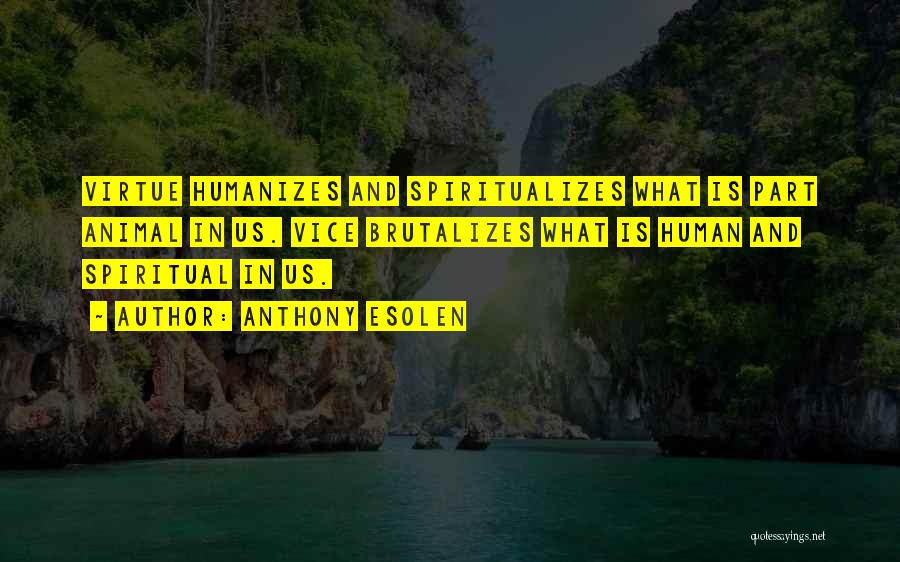
Virtue humanizes and spiritualizes what is part animal in us. Vice brutalizes what is human and spiritual in us. — Anthony Esolen
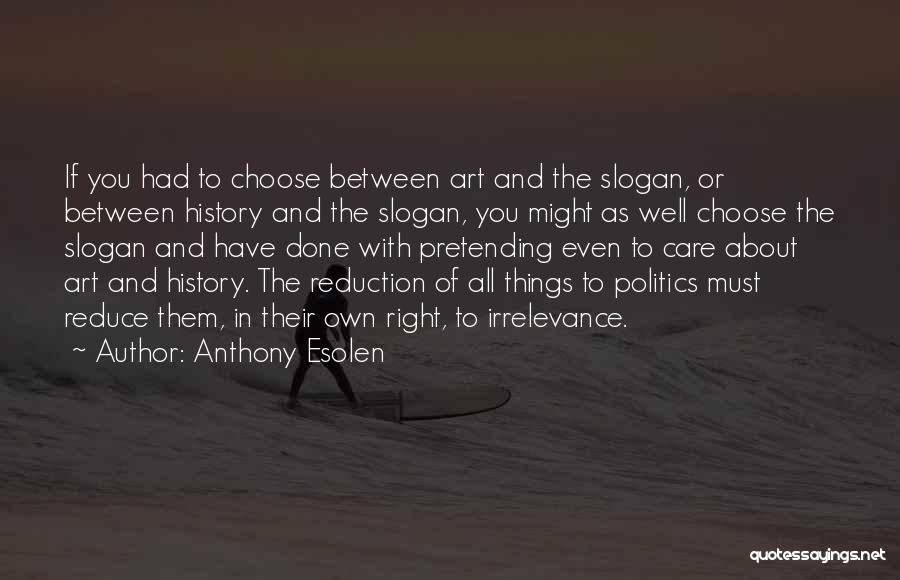
If you had to choose between art and the slogan, or between history and the slogan, you might as well choose the slogan and have done with pretending even to care about art and history. The reduction of all things to politics must reduce them, in their own right, to irrelevance. — Anthony Esolen
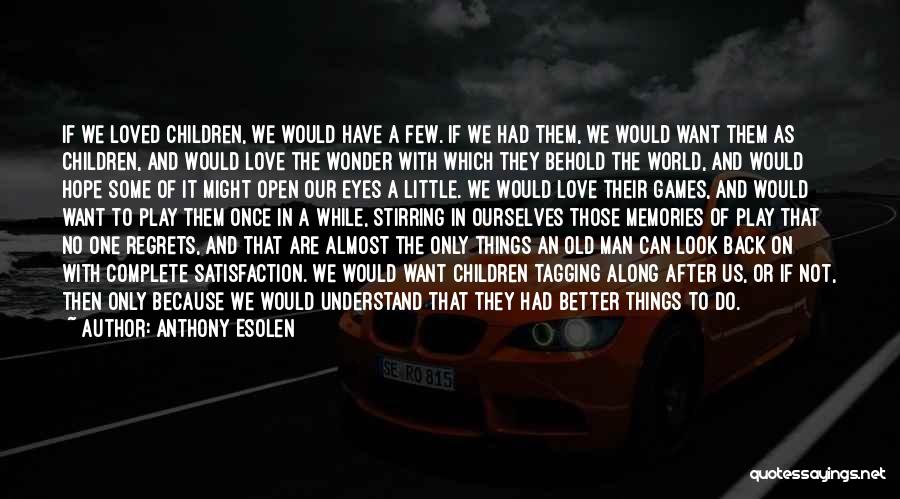
If we loved children, we would have a few. If we had them, we would want them as children, and would love the wonder with which they behold the world, and would hope some of it might open our eyes a little. We would love their games, and would want to play them once in a while, stirring in ourselves those memories of play that no one regrets, and that are almost the only things an old man can look back on with complete satisfaction. We would want children tagging along after us, or if not, then only because we would understand that they had better things to do. — Anthony Esolen
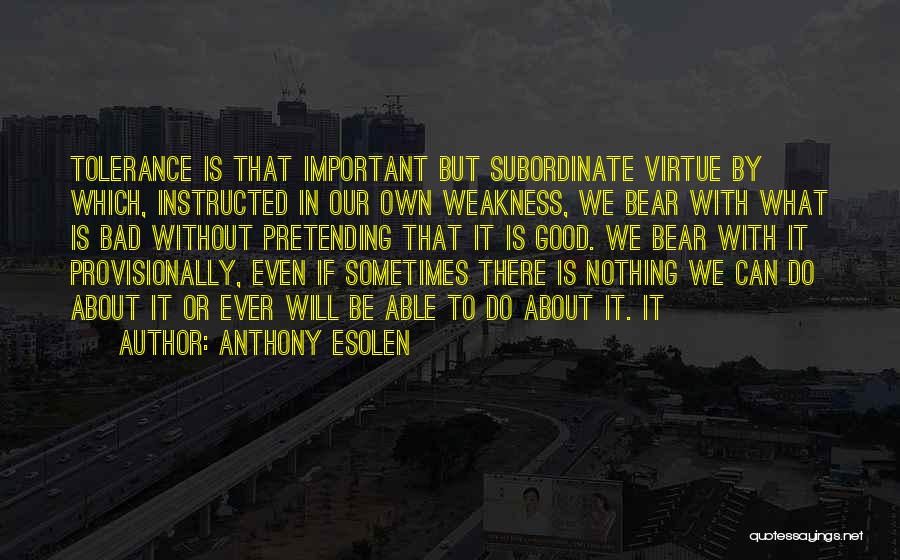
Tolerance is that important but subordinate virtue by which, instructed in our own weakness, we bear with what is bad without pretending that it is good. We bear with it provisionally, even if sometimes there is nothing we can do about it or ever will be able to do about it. It — Anthony Esolen
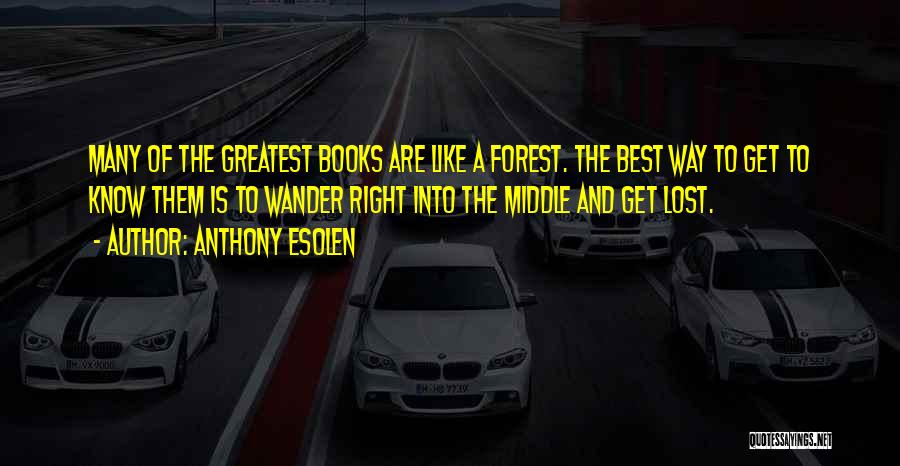
Many of the greatest books are like a forest. The best way to get to know them is to wander right into the middle and get lost. — Anthony Esolen
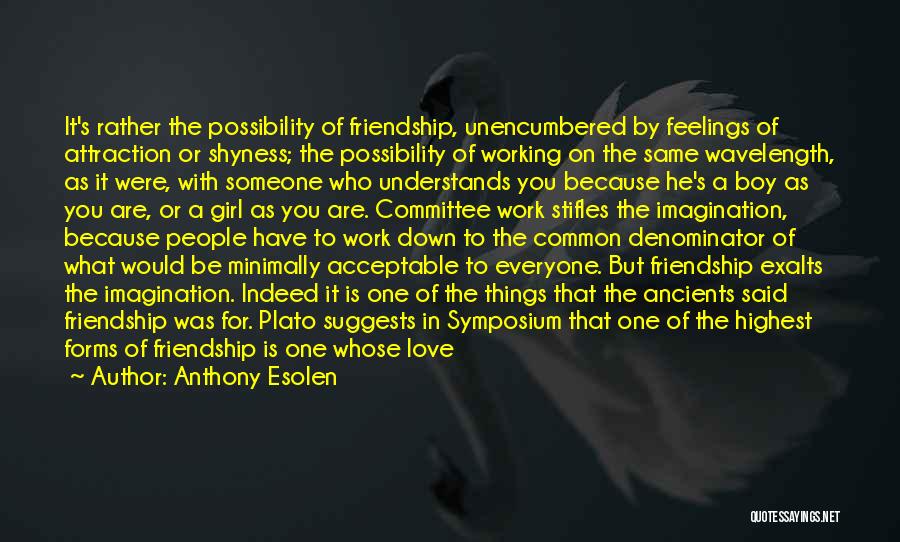
It's rather the possibility of friendship, unencumbered by feelings of attraction or shyness; the possibility of working on the same wavelength, as it were, with someone who understands you because he's a boy as you are, or a girl as you are. Committee work stifles the imagination, because people have to work down to the common denominator of what would be minimally acceptable to everyone. But friendship exalts the imagination. Indeed it is one of the things that the ancients said friendship was for. Plato suggests in Symposium that one of the highest forms of friendship is one whose love issues forth in beautiful and virtuous deeds, for thus the partnership between [the friends] will be far closer and the bond of affection far stronger than between ordinary parents, because the children that they share surpass human children by being immortal as well as more beautiful. — Anthony Esolen
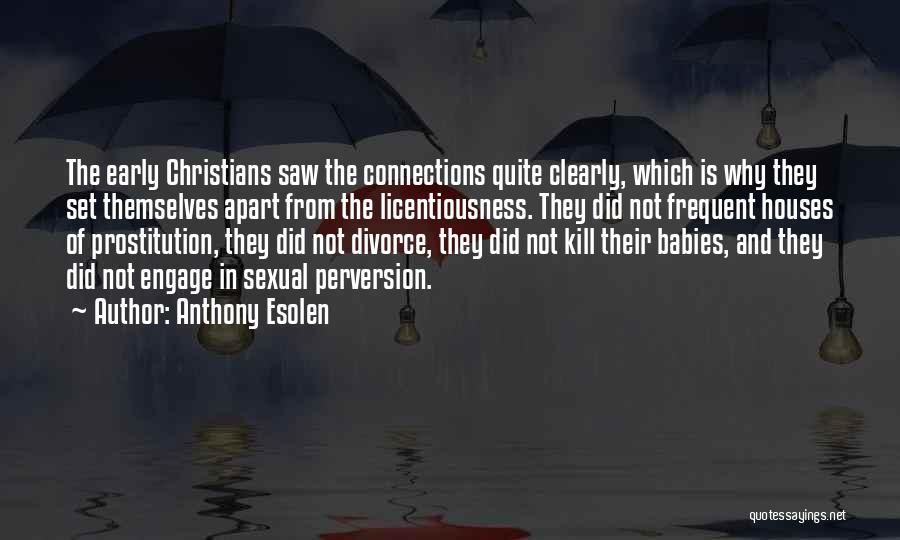
The early Christians saw the connections quite clearly, which is why they set themselves apart from the licentiousness. They did not frequent houses of prostitution, they did not divorce, they did not kill their babies, and they did not engage in sexual perversion. — Anthony Esolen
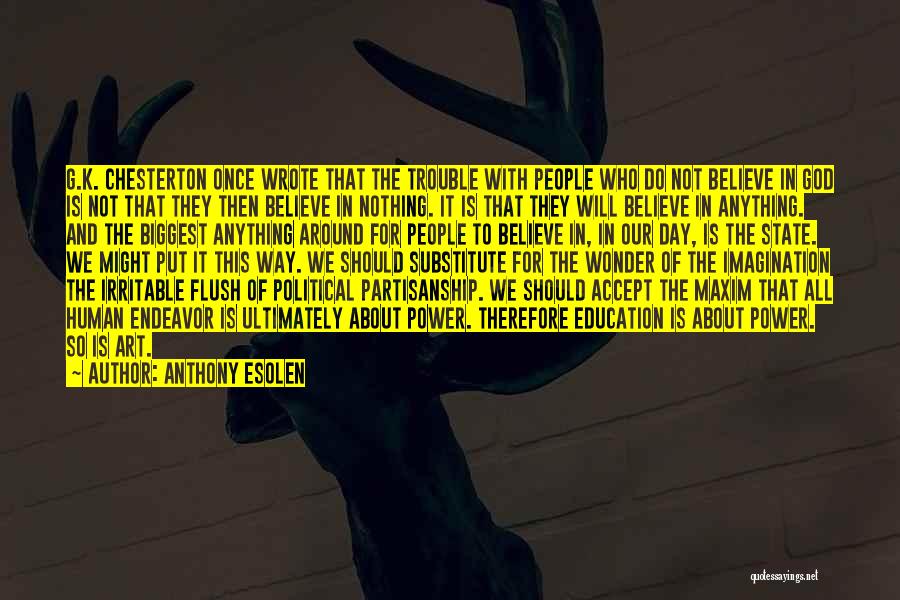
G.K. Chesterton once wrote that the trouble with people who do not believe in God is not that they then believe in nothing. It is that they will believe in anything. And the biggest anything around for people to believe in, in our day, is the State. We might put it this way. We should substitute for the wonder of the imagination the irritable flush of political partisanship. We should accept the maxim that all human endeavor is ultimately about power. Therefore education is about power. So is art. — Anthony Esolen
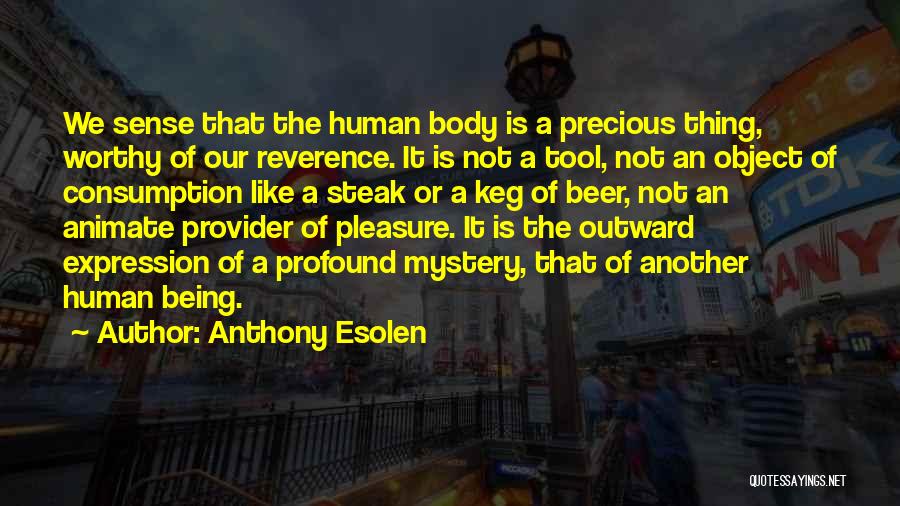
We sense that the human body is a precious thing, worthy of our reverence. It is not a tool, not an object of consumption like a steak or a keg of beer, not an animate provider of pleasure. It is the outward expression of a profound mystery, that of another human being. — Anthony Esolen
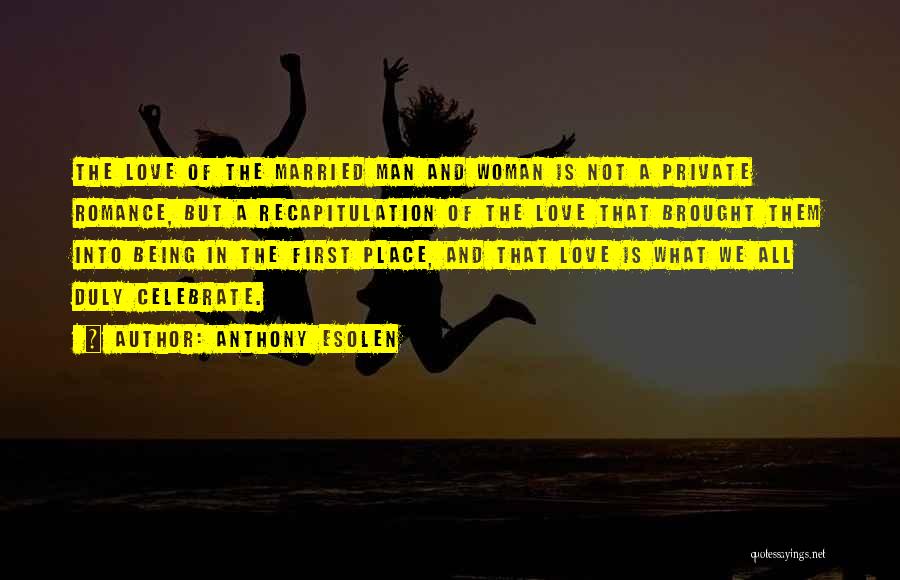
The love of the married man and woman is not a private romance, but a recapitulation of the love that brought them into being in the first place, and that love is what we all duly celebrate. — Anthony Esolen
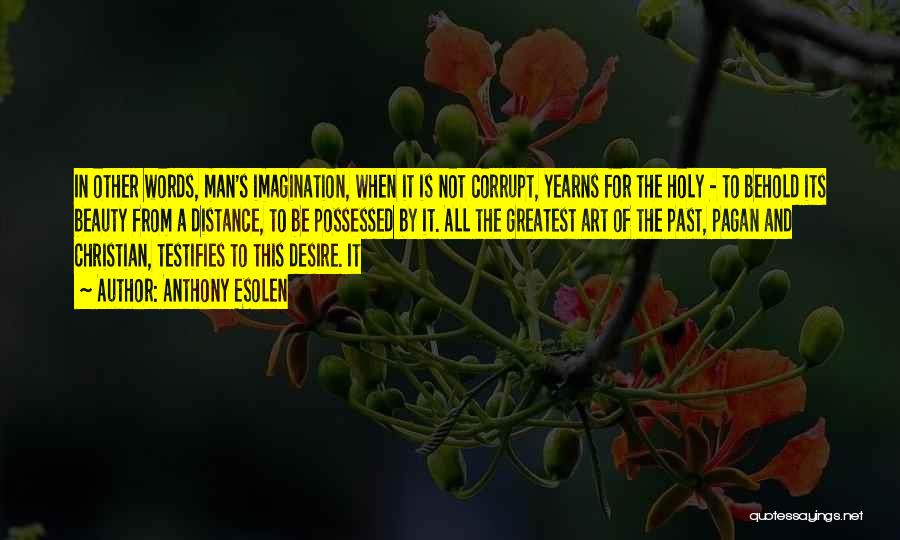
In other words, man's imagination, when it is not corrupt, yearns for the holy - to behold its beauty from a distance, to be possessed by it. All the greatest art of the past, pagan and Christian, testifies to this desire. It — Anthony Esolen
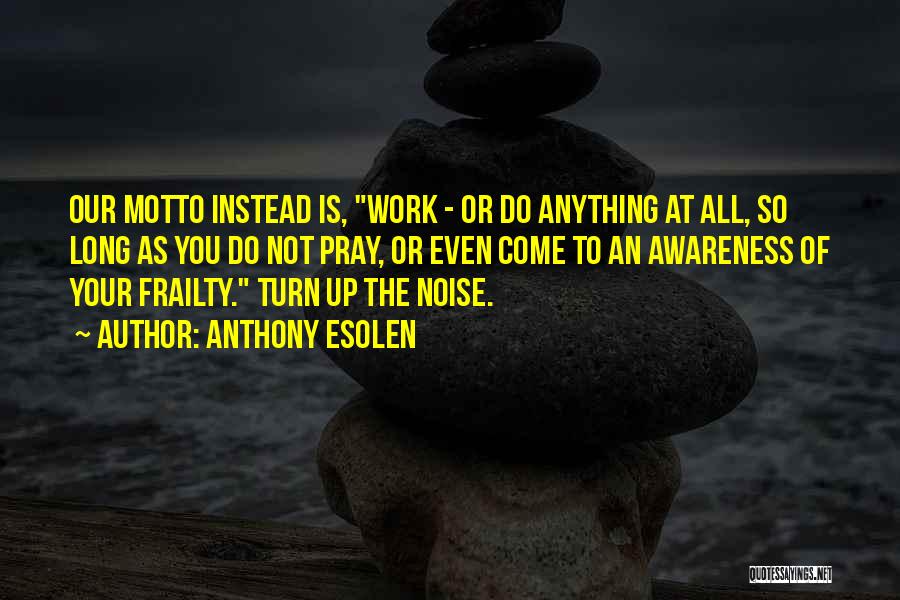
Our motto instead is, "Work - or do anything at all, so long as you do not pray, or even come to an awareness of your frailty." Turn up the noise. — Anthony Esolen
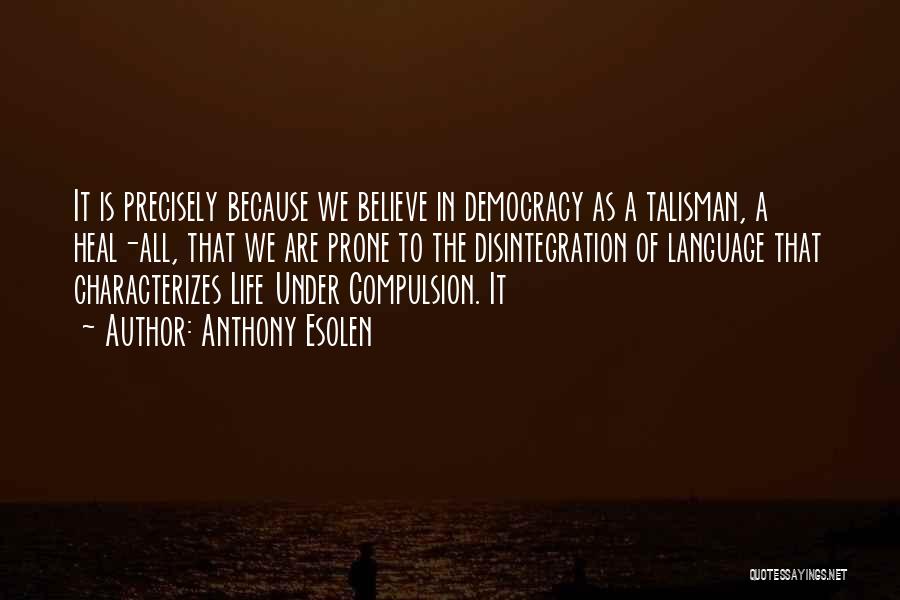
It is precisely because we believe in democracy as a talisman, a heal-all, that we are prone to the disintegration of language that characterizes Life Under Compulsion. It — Anthony Esolen
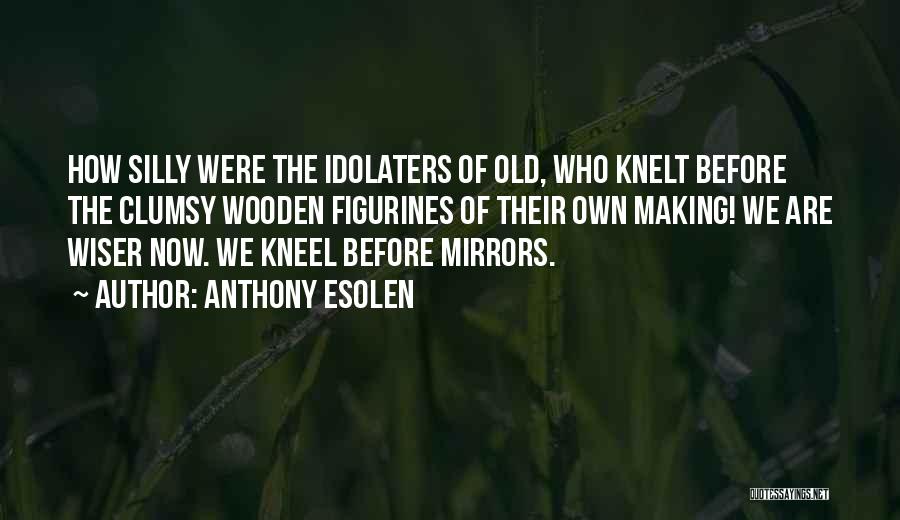
How silly were the idolaters of old, who knelt before the clumsy wooden figurines of their own making! We are wiser now. We kneel before mirrors. — Anthony Esolen
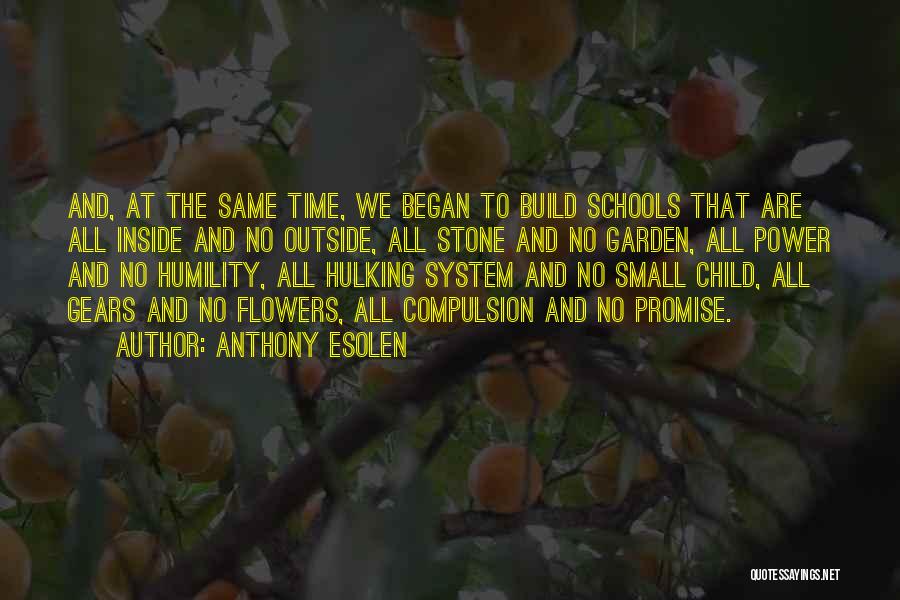
And, at the same time, we began to build schools that are all inside and no outside, all stone and no garden, all power and no humility, all hulking system and no small child, all gears and no flowers, all compulsion and no promise. — Anthony Esolen
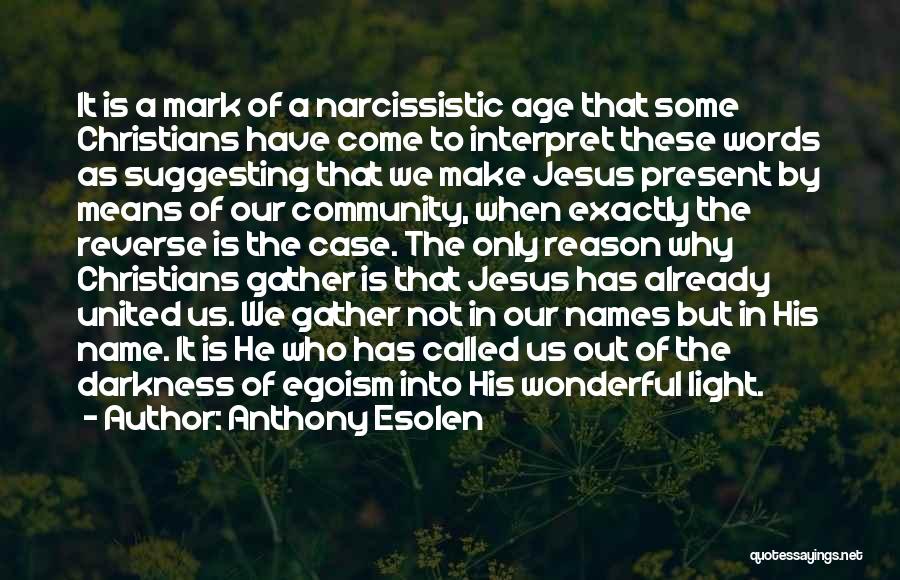
It is a mark of a narcissistic age that some Christians have come to interpret these words as suggesting that we make Jesus present by means of our community, when exactly the reverse is the case. The only reason why Christians gather is that Jesus has already united us. We gather not in our names but in His name. It is He who has called us out of the darkness of egoism into His wonderful light. — Anthony Esolen
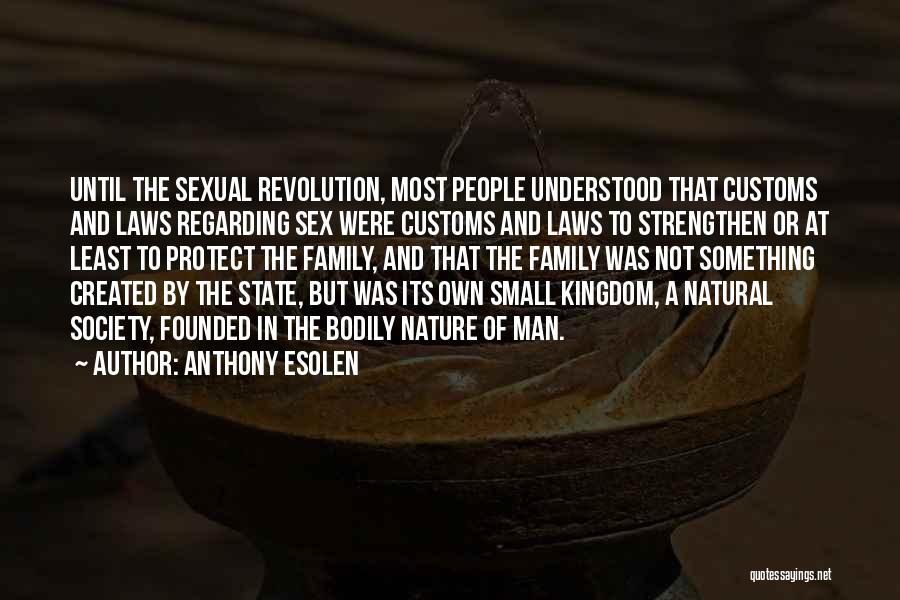
Until the sexual revolution, most people understood that customs and laws regarding sex were customs and laws to strengthen or at least to protect the family, and that the family was not something created by the State, but was its own small kingdom, a natural society, founded in the bodily nature of man. — Anthony Esolen
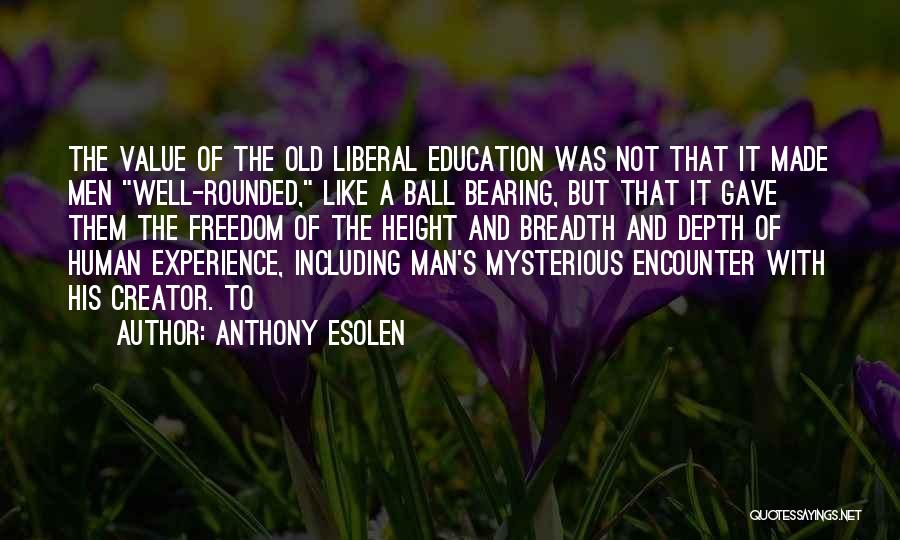
The value of the old liberal education was not that it made men "well-rounded," like a ball bearing, but that it gave them the freedom of the height and breadth and depth of human experience, including man's mysterious encounter with his Creator. To — Anthony Esolen
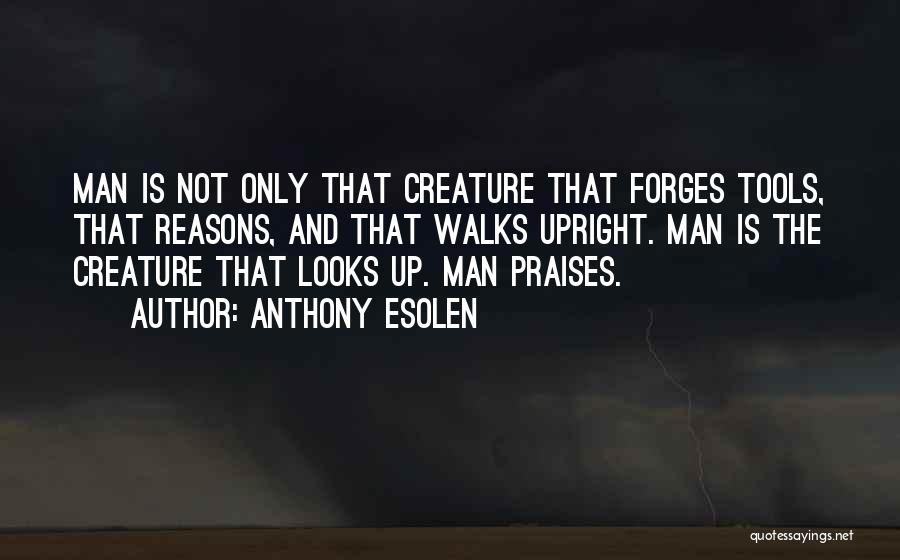
Man is not only that creature that forges tools, that reasons, and that walks upright. Man is the creature that looks up. Man praises. — Anthony Esolen
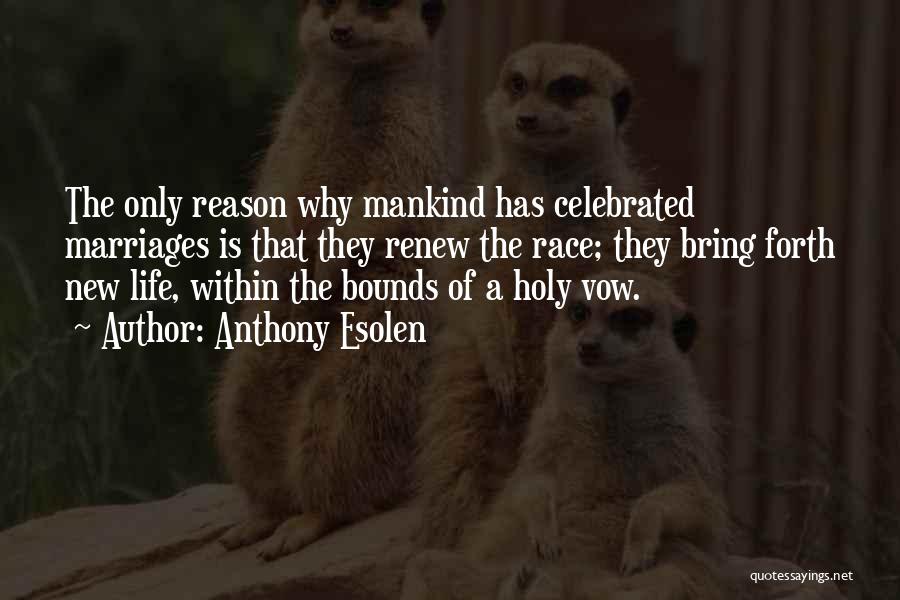
The only reason why mankind has celebrated marriages is that they renew the race; they bring forth new life, within the bounds of a holy vow. — Anthony Esolen
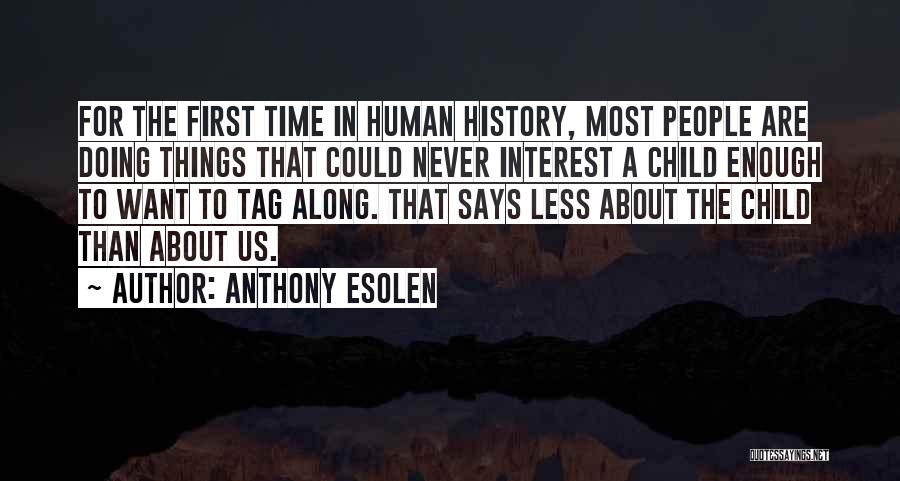
For the first time in human history, most people are doing things that could never interest a child enough to want to tag along. That says less about the child than about us. — Anthony Esolen
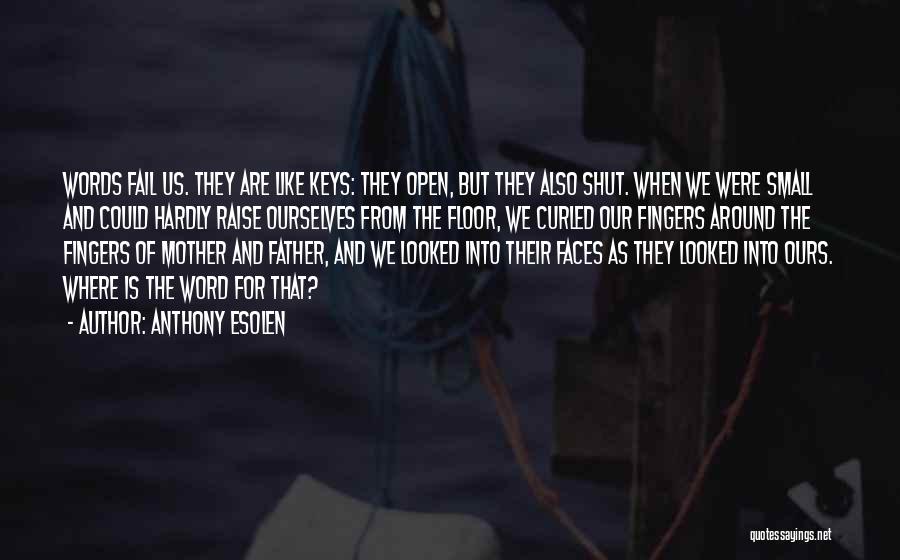
Words fail us. They are like keys: they open, but they also shut. When we were small and could hardly raise ourselves from the floor, we curled our fingers around the fingers of mother and father, and we looked into their faces as they looked into ours. Where is the word for that? — Anthony Esolen
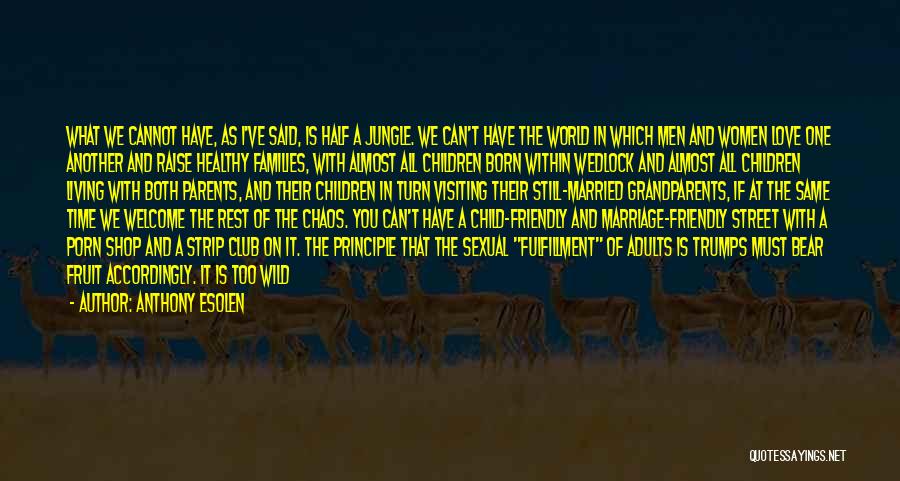
What we cannot have, as I've said, is half a jungle. We can't have the world in which men and women love one another and raise healthy families, with almost all children born within wedlock and almost all children living with both parents, and their children in turn visiting their still-married grandparents, if at the same time we welcome the rest of the chaos. You can't have a child-friendly and marriage-friendly street with a porn shop and a strip club on it. The principle that the sexual "fulfillment" of adults is trumps must bear fruit accordingly. It is too wild a thing to nip here and there. It has to be uprooted. It is unworthy of a civilized and self-governing people. — Anthony Esolen
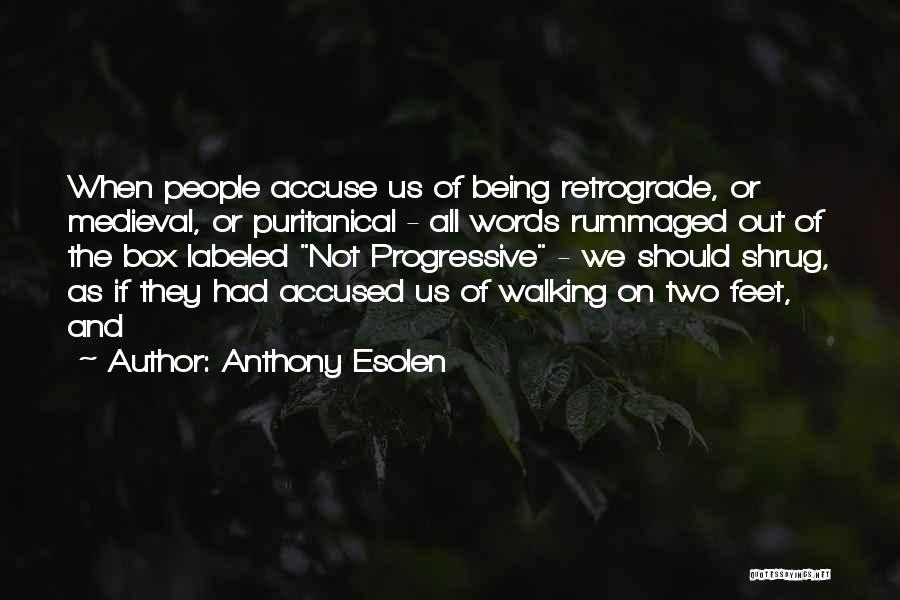
When people accuse us of being retrograde, or medieval, or puritanical - all words rummaged out of the box labeled "Not Progressive" - we should shrug, as if they had accused us of walking on two feet, and — Anthony Esolen
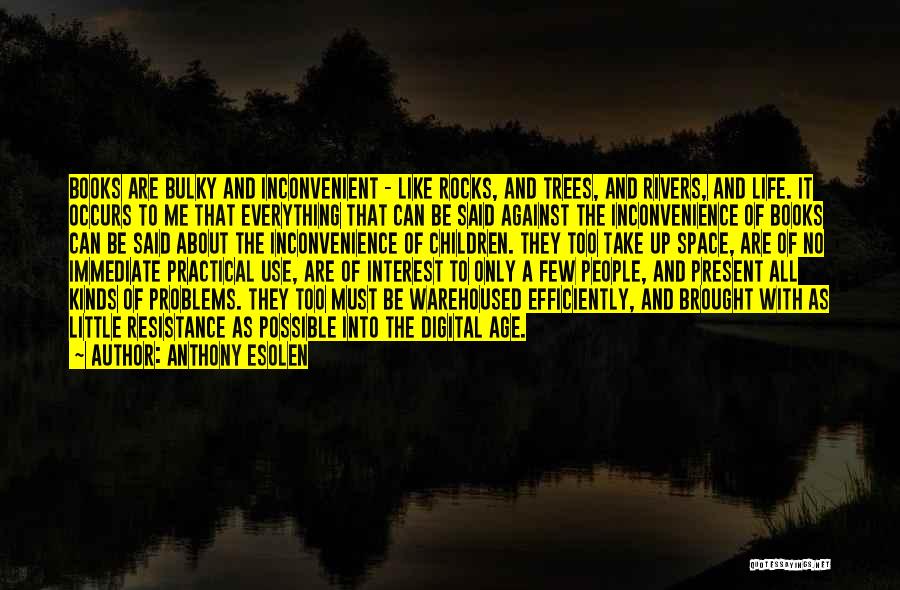
Books are bulky and inconvenient - like rocks, and trees, and rivers, and life. It occurs to me that everything that can be said against the inconvenience of books can be said about the inconvenience of children. They too take up space, are of no immediate practical use, are of interest to only a few people, and present all kinds of problems. They too must be warehoused efficiently, and brought with as little resistance as possible into the Digital Age. — Anthony Esolen
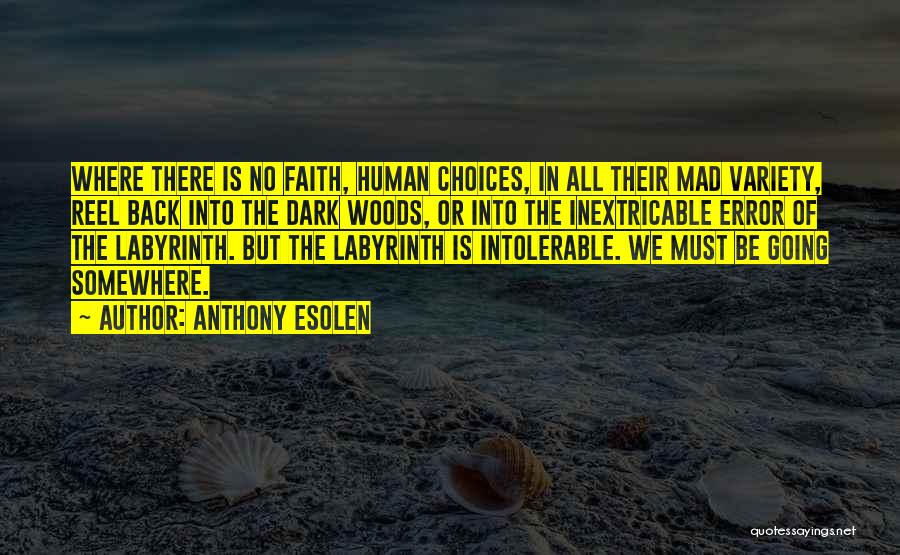
Where there is no faith, human choices, in all their mad variety, reel back into the dark woods, or into the inextricable error of the labyrinth. But the labyrinth is intolerable. We must be going somewhere. — Anthony Esolen
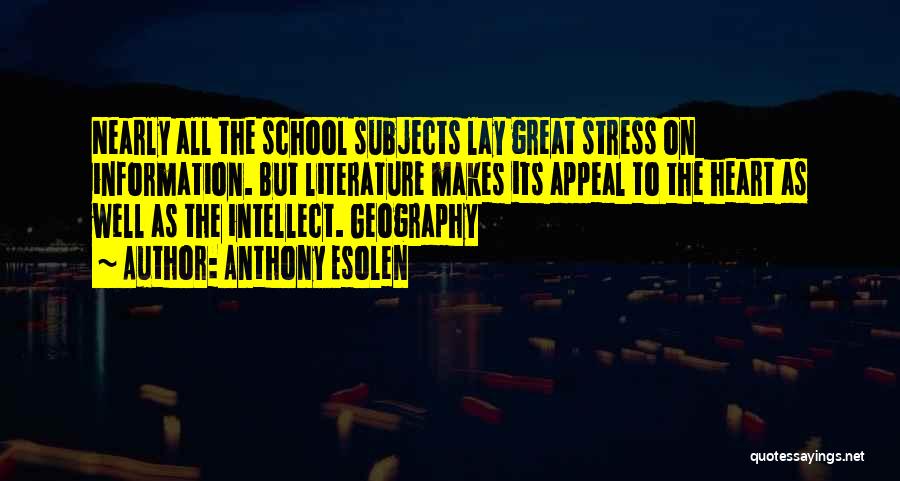
Nearly all the school subjects lay great stress on information. But literature makes its appeal to the heart as well as the intellect. Geography — Anthony Esolen
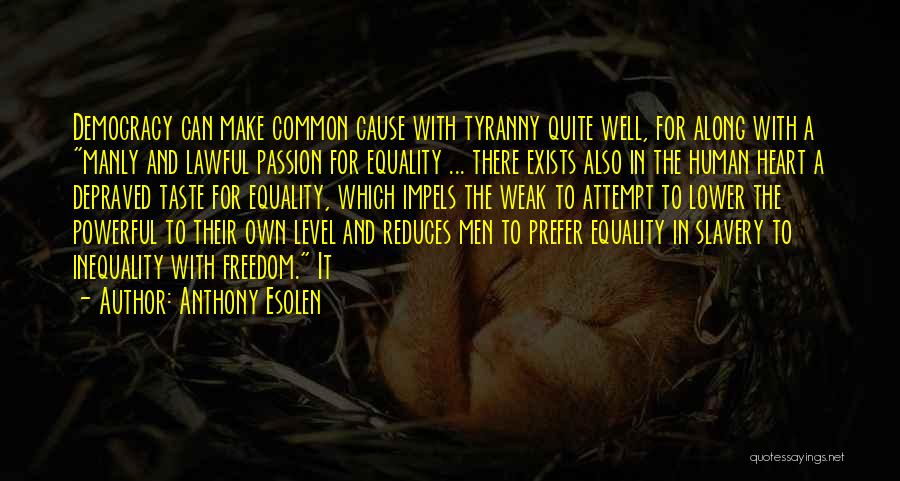
Democracy can make common cause with tyranny quite well, for along with a "manly and lawful passion for equality ... there exists also in the human heart a depraved taste for equality, which impels the weak to attempt to lower the powerful to their own level and reduces men to prefer equality in slavery to inequality with freedom." It — Anthony Esolen
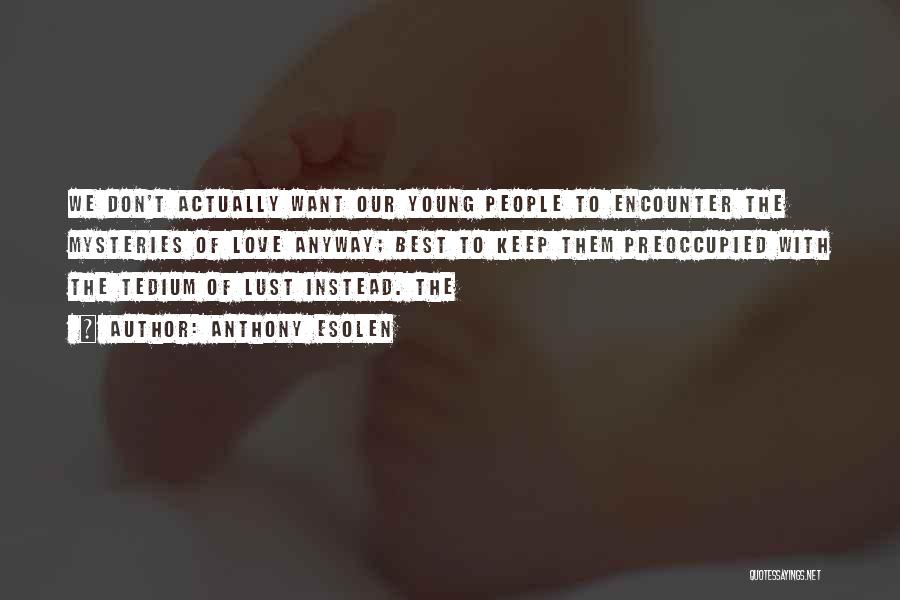
We don't actually want our young people to encounter the mysteries of love anyway; best to keep them preoccupied with the tedium of lust instead. The — Anthony Esolen
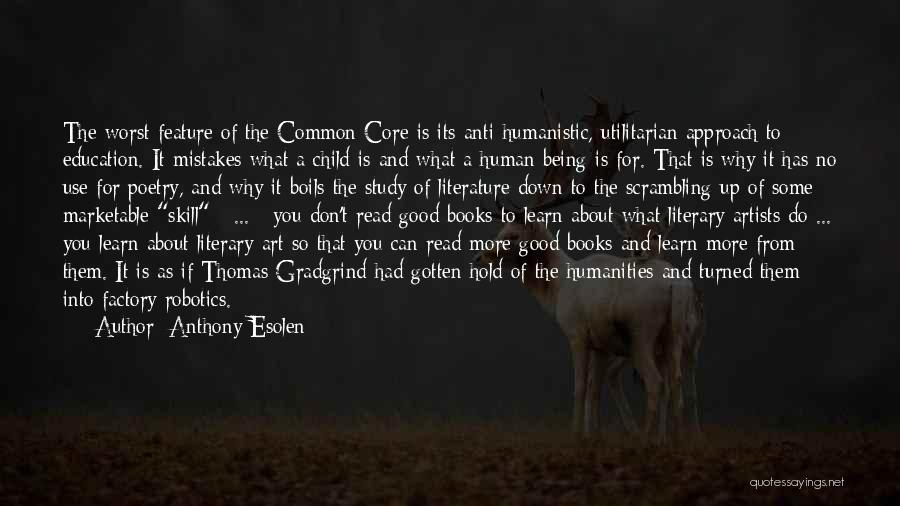
The worst feature of the Common Core is its anti-humanistic, utilitarian approach to education. It mistakes what a child is and what a human being is for. That is why it has no use for poetry, and why it boils the study of literature down to the scrambling up of some marketable "skill" [ ... ] you don't read good books to learn about what literary artists do ... you learn about literary art so that you can read more good books and learn more from them. It is as if Thomas Gradgrind had gotten hold of the humanities and turned them into factory robotics. — Anthony Esolen
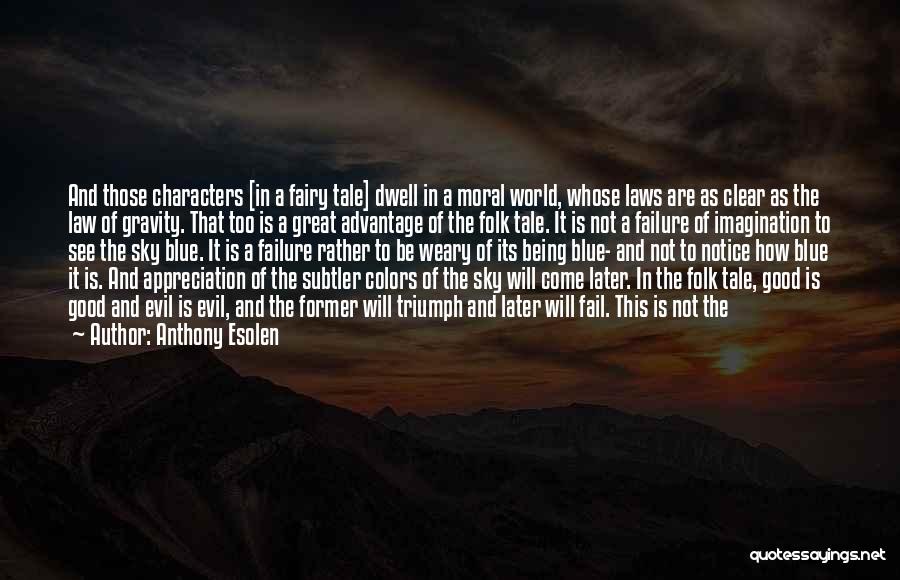
And those characters [in a fairy tale] dwell in a moral world, whose laws are as clear as the law of gravity. That too is a great advantage of the folk tale. It is not a failure of imagination to see the sky blue. It is a failure rather to be weary of its being blue- and not to notice how blue it is. And appreciation of the subtler colors of the sky will come later. In the folk tale, good is good and evil is evil, and the former will triumph and later will fail. This is not the result of the imaginative quest. It is rather its principle and foundation. It is what will enable the child later on to understand Macbeth, or Don Quixote, or David Copperfield. — Anthony Esolen
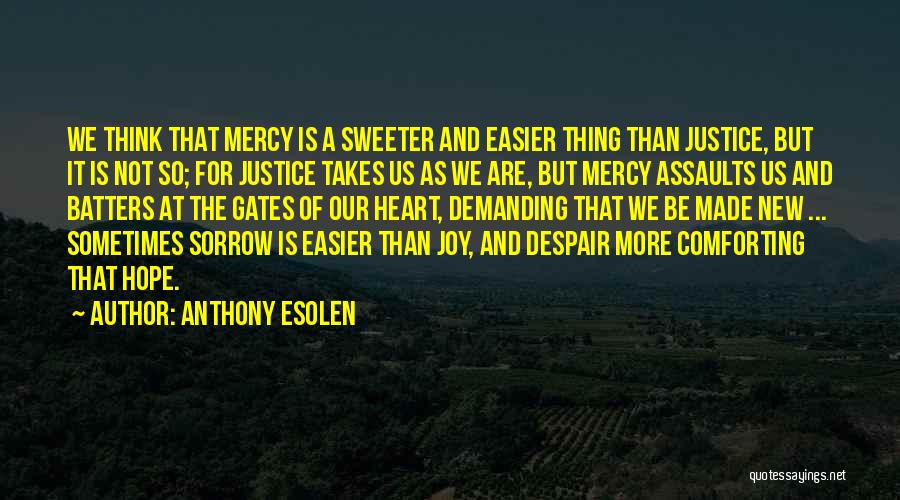
We think that mercy is a sweeter and easier thing than justice, but it is not so; for justice takes us as we are, but mercy assaults us and batters at the gates of our heart, demanding that we be made new ... Sometimes sorrow is easier than joy, and despair more comforting that hope. — Anthony Esolen
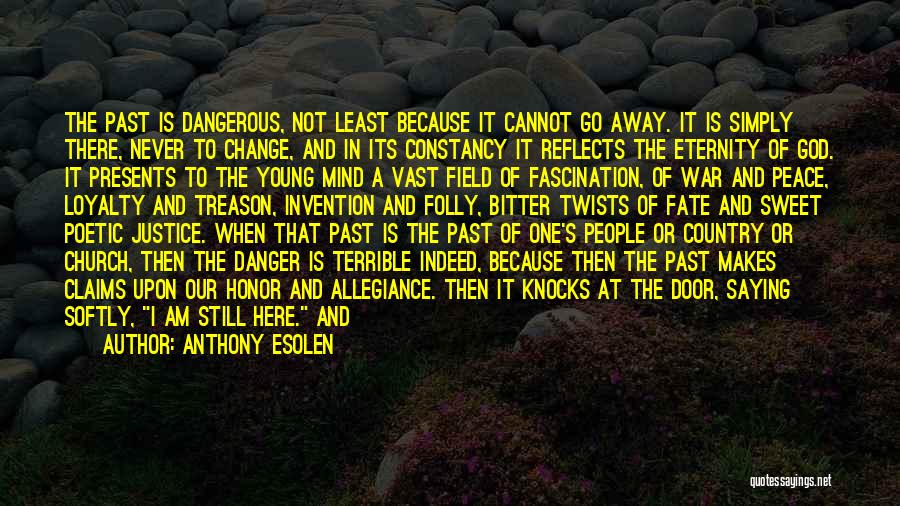
The past is dangerous, not least because it cannot go away. It is simply there, never to change, and in its constancy it reflects the eternity of God. It presents to the young mind a vast field of fascination, of war and peace, loyalty and treason, invention and folly, bitter twists of fate and sweet poetic justice. When that past is the past of one's people or country or church, then the danger is terrible indeed, because then the past makes claims upon our honor and allegiance. Then it knocks at the door, saying softly, "I am still here." And then our plans for social control - for inducing the kind of amnesia that has people always hankering after what is supposed to be new, without asking inconvenient questions about where the desirable thing has come from and where it will take us - must fail. For a man with a past may be free; but a man without a past, never. — Anthony Esolen
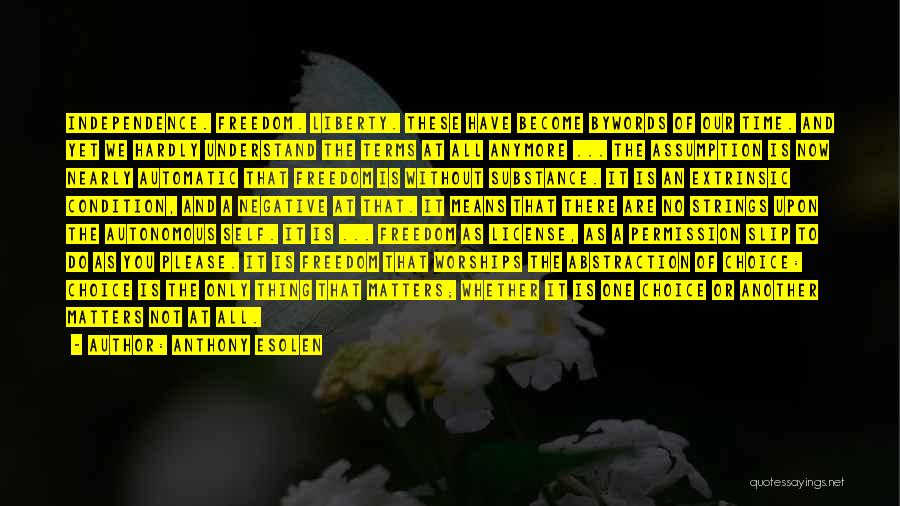
Independence. Freedom. Liberty. These have become bywords of our time. And yet we hardly understand the terms at all anymore ... The assumption is now nearly automatic that freedom is without substance. It is an extrinsic condition, and a negative at that. It means that there are no strings upon the autonomous self. It is ... freedom as license, as a permission slip to do as you please. It is freedom that worships the abstraction of choice: choice is the only thing that matters; whether it is one choice or another matters not at all. — Anthony Esolen






